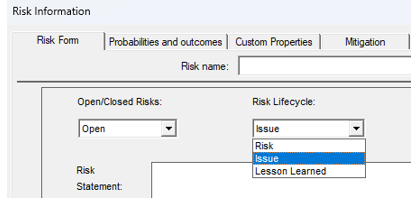Incidents vs Issues
Moderator: Intaver Support
Incidents vs Issues
I have been reading through your documentation and see that there are both issues and incidents referenced, and both are indicators that a risk has occurred. What is the difference between the two?
Ken the PM
-
Intaver Support
- Posts: 1018
- Joined: Wed Nov 09, 2005 9:55 am
Re: Incidents vs Issues
Incidents and issues are interrelated but are used differently within RiskyProject to analyze and manage risks through the risk lifecycle.
Issues are part of the Risk Lifecycle on how risks should be managed. In Risk Lifecycle risks can go through three phases: Risks, Issues, and Lessons Learned. In the Risk Phase, this is a potential problem or opportunity that has not yet been realized that has a probability that is between 0 and 100%. This probability may change over this lifecycle. If risk is realized e.g it occurs, this means that the probability is no longer uncertain, it is 100%. When a risk changes to an issue, in the risk analysis, the probability that is used in the risk scoring is 100%. When a risk becomes an issue, this can also trigger a response plan. Risks can be flagged as issues in the Risk Lifecycle drop-down list that is available in the Risk Form.

Incidents are available as part of RiskyProject Enterprise. As a risk can be assigned to multiple projects in a portfolio, this means that individual instances of this risk can occur in one project, but not another or can occur multiple times. Incidents are linked to risks and track the number of times a risk occurs in both a project, summary project, or portfolio. Similar to risk, Incidents have register in which you can track different properties such as when, where, severity etc. This can be a very useful way of identifying priority risks within your organization.
Issues are part of the Risk Lifecycle on how risks should be managed. In Risk Lifecycle risks can go through three phases: Risks, Issues, and Lessons Learned. In the Risk Phase, this is a potential problem or opportunity that has not yet been realized that has a probability that is between 0 and 100%. This probability may change over this lifecycle. If risk is realized e.g it occurs, this means that the probability is no longer uncertain, it is 100%. When a risk changes to an issue, in the risk analysis, the probability that is used in the risk scoring is 100%. When a risk becomes an issue, this can also trigger a response plan. Risks can be flagged as issues in the Risk Lifecycle drop-down list that is available in the Risk Form.

Incidents are available as part of RiskyProject Enterprise. As a risk can be assigned to multiple projects in a portfolio, this means that individual instances of this risk can occur in one project, but not another or can occur multiple times. Incidents are linked to risks and track the number of times a risk occurs in both a project, summary project, or portfolio. Similar to risk, Incidents have register in which you can track different properties such as when, where, severity etc. This can be a very useful way of identifying priority risks within your organization.
Intaver Support Team
Intaver Institute Inc.
Home of Project Risk Management and Project Risk Analysis software RiskyProject
www.intaver.com
Intaver Institute Inc.
Home of Project Risk Management and Project Risk Analysis software RiskyProject
www.intaver.com